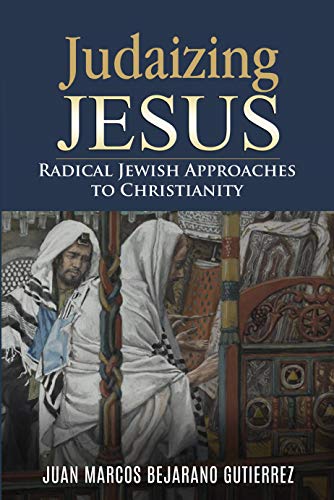Click to join the conversation with over 500,000 Pentecostal believers and scholars
Click to get our FREE MOBILE APP and stay connected
| PentecostalTheology.com



 Juan Marcos Bejarano Gutierrez, Judaizing Jesus: Radical Jewish Approaches to Christianity (Grand Prairie, TX: Yaron Publishing, 2019), ISBN 9781705609019.
Juan Marcos Bejarano Gutierrez, Judaizing Jesus: Radical Jewish Approaches to Christianity (Grand Prairie, TX: Yaron Publishing, 2019), ISBN 9781705609019.
New Testament readers are all too familiar with the concept of judiazers, those who attempt to force Christians into following the rituals and traditions of Jewish Orthodoxy. How surprising then, to find a title that attempts to judiaze Jesus, to focus on his doctrines through a traditional Jewish lens.
That is exactly what Judaizing Jesus does in one short but remarkable read.
First, it is important to note that the author and researcher, Juan Marcos Bejarano Gutierrez is a traditional rabbi and does not acknowledge Jesus as Messiah. To be clear, this is not a Christian book.
What Judaizing Jesus does is it provides you with a concise history of how Judaism has perceived Christianity – and to a lesser degree Jesus – throughout the ages. It brings to light Jewish thought about Gentiles as represented in the Talmud, then follows up with the changes that occurred during the Christian expansion in the Medieval, Renaissance, and the Modern eras.
How has Judaism perceived Christianity throughout the ages?
As you read you may begin to understand how the Christian faith has been understood from the Jewish, and by extension, other faiths. This understanding may help you express Christianity in a way that considers historical obstacles to Jesus and provides a platform for a more open and honest conversation.
Once Christianity became the state-recognized faith of Rome, relations between the church and Jewish communities became tense. But Rome went from a pagan empire—that is to say, a polytheistic culture—and transformed into a monotheistic one. The rabbis, particularly in Rome, took note and some came to see Christianity’s faith in a unified godhead as not exactly acceptable, but no longer pagan, either. This, of course, was a minority view.
Time passed and along came Islam, a second religion insisting on the unity of God. From the Jewish perspective, the world was becoming less pagan – more monotheistic – due to Christianity and Islam’s influence, meaning they could enter into business relationships with monotheists.
Still, this was a minority opinion, but a growing one, as Jewish communities in the European diaspora needed trade to survive, and other professions were often prohibited to them. Jewish tradition prohibits merchants from entering into business with pagans, so from a religious perspective, Christianizing the world had a positive impact on Jewish/Christian relations, at least where commerce was concerned.
But of spiritual relevance, the book is dotted with insights, such as this one from Rabbi Abraham Farissol of Ferrara, Italy (1451–1528). “Where Farissol departed from the standard Jewish response was his insistence that Jesus and his disciples of the first generation were devout followers of the Torah” (p. 76). Given the theological chasm that divided Christianity and Judaism, such a statement likely came as a surprise to both camps in the 15th and 16th Centuries.
He also notes that, “Astonishingly, Rabbi Farissol’s radical innovation was his willingness to posit the possibility that Jesus was, in fact, the messiah. He had undeniably come for the Gentiles” (p.79), and, “Let us concede that their messiah [Jesus] is indeed a messiah for them….” (p.80).
Gutierrez also quotes Rabbi Simeon ben Zemah (1361–1444) on Paul and Acts 28:17–18: “when one of the Apostles was brought to Rome, bound in chains, he called to the Jews who were there and said to them that he had not done anything against the Jews and that he did not differ at all with their ancestral custom. He also said that the Jews of Jerusalem had not found in him anything deserving of the death penalty. And had he differed with the Torah, he would have been deserving of the death penalty. And similarly, he wrote in one of his books that he believes in everything which is in the Torah” (p.79). Again, likely a surprise to both Christians and contemporary Jewish scholars.
A few pages later comes a remarkable admission from a rabbi that is not messianic, “It was not God who took on human form. Jesus was instead an emanation of God that became human” (p.86).
Gutierrez’s book is 60% content and 40% footnotes, so everything is meticulously sourced should you wish to do further research.
Judaizing Jesus shares the dark side of Christian behavior as well, but there are sufficient snippets of historical perspectives on Jesus and the Christian faith to make one pause and think, as any good book should.
Reviewed by Kevin Williams




Anonymous
Bad link!